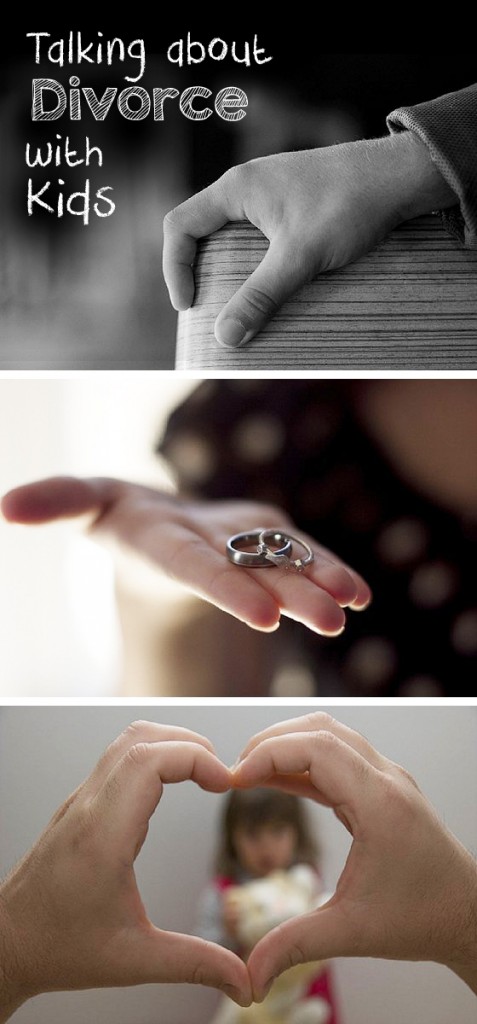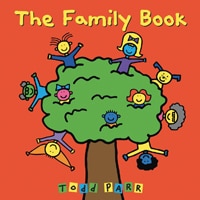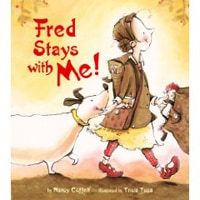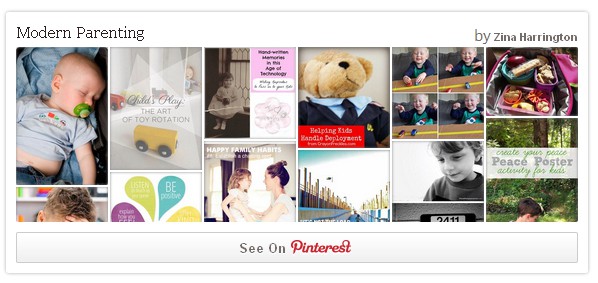
"Mom?" she whispered. Then my daughter paused. A long pause. The kind of drawn out pause that alerts a parent, THIS is going to be an important conversation.
It was 5:55am and she had just climbed under the covers to snuggle. I tried to snap myself awake, sensing the depth of the conversation. I gathered my wits from Mr. Sandman and attempted to nonchalantly ask, "What's up, honey?"
 "Abby said her parents might get divorced.
"Abby said her parents might get divorced.
She was crying."
The statement came out of left field. My mind began to race. We live in a world where our children WILL have classmates, friends, or even cousins whose parents get divorced.
How do you tell your child "it happens" without instilling fear that it could happen to YOUR family?
Here are five tips for talking about divorce with your kids from some of my favorite 20 Pinterest Moms and friends:
1. Investigate where your child is coming from...
I think one of the first parts of any conversation like this needs to be investigating where your child is coming from on the subject - gently gathering facts and feelings from them so that you can best judge what kind of input they're needing from you.
I don't know how much you really need to get into describing that "this happens." Perhaps in older children that would come up, which you can feel out if you engage your child in conversation and listen for what they're concerned about, but right now, for instance, my mom and step-dad are separated and I don't sense any fear in my children (ages 8 and under) that this would happen between me and my husband. We've basically described it that "Nana and Grandpa are having some difficulties right now. They are moving into separate houses and trying to learn better ways to communicate with each other.... Yes, you can go visit Nana's new house!"
Alissa Marquess from Creative with Kids
2. Reassure your child ...
When my eight year-old son asked about divorce one day in a general sense, I wondered -- and it soon became clear -- that what he was really asking was whether or not his dad and I might ever divorce. I explained to him that when we got married we made covenants, promises, to each other and to God, and we promised to keep those covenants forever and ever. Sometimes people make choices that break those promises, and it's very sad. People do the best they can to fix those choices, but sometimes part of the fixing means they get divorced. But I reassured him that his dad and I make choices every single day that help us keep our promises, and that we work to make our covenant a forever covenant for our whole family . . . Read more here
Amanda Morgan from Not Just Cute
3. Don't feel pressured to throw out an immediate response...
Whenever I am faced with a challenging kid conversation I take a step back. My emotions, experiences and initial desire to protect my kids can be so overwhelming. The last thing I want to do is say or do something in the heat of the moment that I can't take back.
I will often tell my kids I need a minute to think about my response... they deserve a thoughtful answer.
This can also be a great example for them on thinking before you speak. Once I have removed my emotions (to the best of my ability) I search out kid friendly books and activities. These can be great not only for helping me slide into an uncomfortable topic but also giving me words to use! With everything kid related (not just the tough stuff). I like to hear their thoughts. "What do you think that means? How does that make you feel? What can you do to help?" This gives me the chance to know exactly what part of the difficult topic they want to discuss and keeps me from going way too far or over their heads. It also gives them a strong voice, creative problem solving skills and the option to just be heard... maybe that's all they need.
Jillian Riley from Mom with a Lesson Plan
4. Teach your child to be a good friend...
Whenever we sense someone is having a rough day, we try and go out of our way to help offer a kind word or gesture. In this case, a happy, sunshiney card or note that just says something very simple like "Thanks for being my friend" from your daughter would really go a long way for her friend. This is the power of friendship and, ultimately, it will be solid, supportive friends who help get the little girl through the hard years to come for her family. I am a child of divorce and the divorce was hard, yes, but the years after were harder, such as when a step-parent came into the picture. None of it's easy -- but all of its easier with good friends to help us smile and make our own way.
I would keep our discussion big picture. Families are always family no matter where they live or what they look like. Parents love their children all the time -- even when they aren't together.
Shawn Fink from Awesomely Awake
5. Read books with your child...
My son has had questions recently because our babysitter's parents got divorced. I went to the library this week to check out kid's books on the subject. Here are some of the strongest titles . . . See the suggested books
Allison McDonald from No Time For Flashcards
A book is always a great way to start a conversation with a child. Below are two highly recommended titles from Erica of What We Do All Day:
The Family Book celebrates the love we feel for our families and all the different varieties they come in.
Whether you have two moms or two dads, a big family or a small family, a clean family or a messy one, Todd Parr assures readers that no matter what kind of family you have, every family is special in its own unique way.
Read the full book summary here.
Look inside the book.
![]()
Fred Stays with Me! is an award-winning story that follows a young girl who turns to the one constant in her life, her dog Fred, in the face of her parents' divorce. In this poignant but not overly sentimental story, Coffelt's accessible and kid-friendly language alongside Tusa's charming artwork create a light, cheerful, and reassuring mood that will comfort any child who has two homes.
![]()
You can also find continual parenting support on these two collaborative Pinterest boards:
Modern Parenting & Parenting with Presence.
The rest of the morning conversation with my daughter rolled out like this:
"Abby said her parents might get divorced. She was crying."
"Oh honey, that's so sad to hear. Were you two alone or where there adults there?"
"Alone at recess."
"Did you give her a hug when you saw she was crying?"
"Yeah."
"That's good," I replied. Then it was my turn to pause, "This happens sometimes in other families. She is lucky to have a friend like you."
"Do you have her email address?"
"No, but I can find out what it is."
"Ok. I want to write her a note."
She typed her friend the sweetest message. My little lady has so much empathy and love. I sent a text to Abby's mother and got her personal email address, so she and her daughter could read the note together at home rather than at school. I figured it was a gentle opportunity for her to open a conversation with her daughter, too.
Divorce is such a tough subject at any age. I'd love to hear people's insights. It will likely be a topic we all cross at one point or another, so let's learn from each others experiences and be ready. Join the conversation on Google+ or Facebook:
Have you discussed divorce with your child? Let's chat in the comments.

 |
 |
 |
 |
 |
|
 |
|||||
![]()
Pin it:

Image Credits:
half'a'heart by Thomas Nielsen
Hands Heart by Fanny
***All book lists contain affiliate links.








